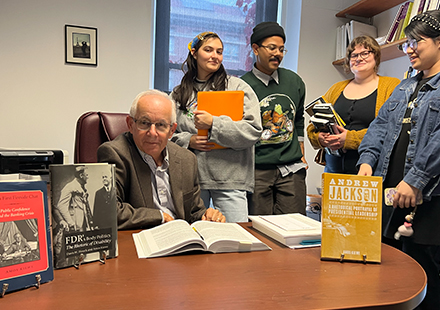
When Professor Amos Kiewe retires at the end of Fall 2022 semester, his absence will be deeply felt, but after an illustrious 31-year tenure at the Department of Communication and Rhetorical Studies (CRS), his legacy will loom large.
“I am most proud of helping the department to become nationally known,” says Kiewe, who rebranded the department from speech communication to communication and rhetorical studies when he was appointed chair in 2001. He served in this role for 10 years, helping to set CRS’s direction. Prior to his role as chair, he was appointed to three-year terms as assistant dean and then associate dean of the College of Visual and Performing Arts.
Under Kiewe’s watch, CRS’s home on the first floor of Sims Hall was redesigned to impeccable standards, funded primarily by a $1 million gift from the Harry T. Mangurian Jr. Foundation Inc. that was facilitated by Terry M. Skuse G’75, grateful parent of CRS major Jeffrey ’05, who studied with Kiewe. The floor layout was redesigned and finished to include three classrooms, one multipurpose room, one graduate student suite, one part-time instructor suite, the department chair suite and faculty offices.
Kiewe was drawn early on to the spoken word and to political propaganda, specifically surrounding the Holocaust. “I was born in Israel, and propaganda for me was the way to explain Hitler and Nazi Germany,” he says. “My parents escaped Germany. Some of my grandparents escaped too and are Holocaust survivors. I decided to invest in it.”
Kiewe authored and edited numerous books, published in prestigious journals and became internationally renowned for his expertise in rhetorical theory and criticism, political communications, presidential studies and argumentation and persuasion. “But teaching is what I will miss the most,” he says.
Rhetorical criticism is Kiewe’s favorite course to teach; it shapes the mentality of his students by analyzing a message further than its initial presentation.
“I teach different methods of criticism; I teach how to see things that often students don’t know or take for granted,” he says. “I usually ruin the lives of students because suddenly they see the news differently, they see the movie differently, they look at the speech differently. So, I complicate life.”
Since starting his career, Kiewe says that his field of study has expanded beyond his best imagination. “When I went to school, we focused on primary speeches, grade speeches and now we have expanded in areas that were never covered,” he says. “Public memory, visual rhetoric, even presidential rhetoric has become much more prolific. We have expanded the time frame for studying the presidency, and that has been quite inspiring.
“I’ve had to teach myself things that I was not taught, and this has made me a student for life,” he says. “Looking back, I feel happy. I was active as a scholar, and I am proud leaving the department.”
To students entering this field of study, Kiewe urges them to push the envelope. “Be innovative,” he says. “Understand the foundation before you embark on new areas. But try. Don’t be afraid of failure. If your article is rejected, everybody’s article is rejected. The key is to understand that if you publish 50% of what you tried, you will be successful.”
